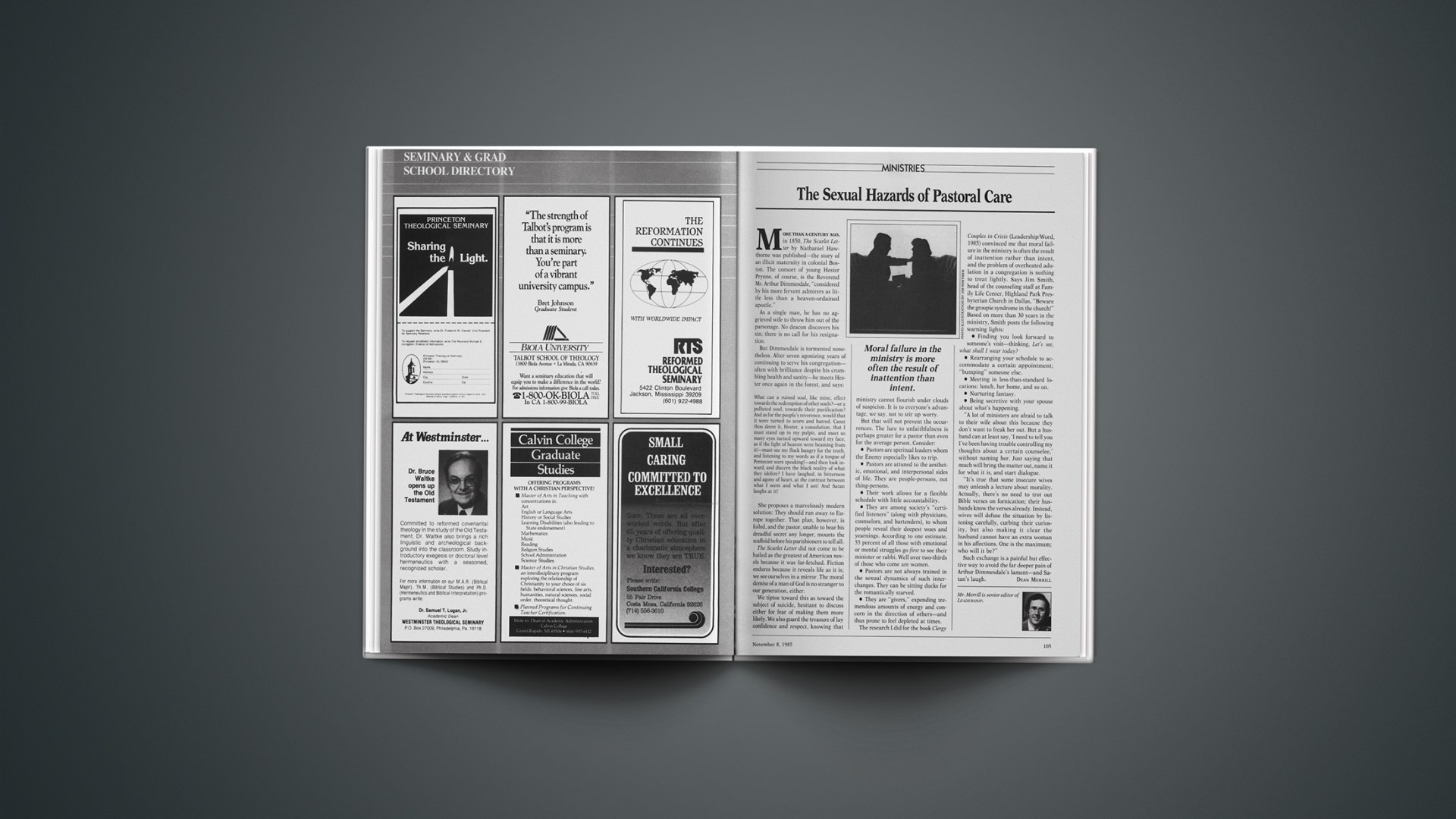More than a century ago, in 1850, The Scarlet Letter by Nathaniel Hawthorne was published—the story of an illicit maternity in colonial Boston. The consort of young Hester Prynne, of course, is the Reverend Mr. Arthur Dimmesdale, “considered by his more fervent admirers as little less than a heaven-ordained apostle.”
As a single man, he has no aggrieved wife to throw him out of the parsonage. No deacon discovers his sin; there is no call for his resignation.
But Dimmesdale is tormented nonetheless. After seven agonizing years of continuing to serve his congregation—often with brilliance despite his crumbling health and sanity—he meets Hester once again in the forest, and says:
What can a ruined soul, like mine, effect towards the redemption of other souls?—or a polluted soul, towards their purification? And as for the people’s reverence, would that it were turned to scorn and hatred. Canst thou deem it, Hester, a consolation, that I must stand up in my pulpit, and meet so many eyes turned upward toward my face, as if the light of heaven were beaming from it!—must see my flock hungry for the truth, and listening to my words as if a tongue of Pentecost were speaking!—and then look inward, and discern the black reality of what they idolize? I have laughed, in bitterness and agony of heart, at the contrast between what I seem and what I am! And Satan laughs at it!
She proposes a marvelously modern solution: They should run away to Europe together. That plan, however, is foiled, and the pastor, unable to bear his dreadful secret any longer, mounts the scaffold before his parishioners to tell all.
The Scarlet Letter did not come to be hailed as the greatest of American novels because it was far-fetched. Fiction endures because it reveals life as it is; we see ourselves in a mirror. The moral demise of a man of God is no stranger to our generation, either.
We tiptoe toward this as toward the subject of suicide, hesitant to discuss either for fear of making them more likely. We also guard the treasure of lay confidence and respect, knowing that ministry cannot flourish under clouds of suspicion. It is to everyone’s advantage, we say, not to stir up worry.
But that will not prevent the occurrences. The lure to unfaithfulness is perhaps greater for a pastor than even for the average person. Consider:
• Pastors are spiritual leaders whom the Enemy especially likes to trip.
• Pastors are attuned to the aesthetic, emotional, and interpersonal sides of life. They are people-persons, not thing-persons.
• Their work allows for a flexible schedule with little accountability.
• They are among society’s “certified listeners” (along with physicians, counselors, and bartenders), to whom people reveal their deepest woes and yearnings. According to one estimate, 55 percent of all those with emotional or mental struggles go first to see their minister or rabbi. Well over two-thirds of those who come are women.
• Pastors are not always trained in the sexual dynamics of such interchanges. They can be sitting ducks for the romantically starved.
• They are “givers,” expending tremendous amounts of energy and concern in the direction of others—and thus prone to feel depleted at times.
The research I did for the book Clergy Couples in Crisis (Leadership/Word, 1985) convinced me that moral failure in the ministry is often the result of inattention rather than intent, and the problem of overheated adulation in a congregation is nothing to treat lightly. Says Jim Smith, head of the counseling staff at Family Life Center, Highland Park Presbyterian Church in Dallas, “Beware the groupie syndrome in the church!” Based on more than 30 years in the ministry, Smith posts the following warning lights:
• Finding you look forward to someone’s visit—thinking, Let’s see, what shall I wear today?
• Rearranging your schedule to accommodate a certain appointment; “bumping” someone else.
• Meeting in less-than-standard locations: lunch, her home, and so on.
• Nurturing fantasy.
• Being secretive with your spouse about what’s happening.
“A lot of ministers are afraid to talk to their wife about this because they don’t want to freak her out. But a husband can at least say, ‘I need to tell you I’ve been having trouble controlling my thoughts about a certain counselee,’ without naming her. Just saying that much will bring the matter out, name it for what it is, and start dialogue.
“It’s true that some insecure wives may unleash a lecture about morality. Actually, there’s no need to trot out Bible verses on fornication; their husbands know the verses already. Instead, wives will defuse the situation by listening carefully, curbing their curiosity, but also making it clear the husband cannot have an extra woman in his affections. One is the maximum; who will it be?”
Such exchange is a painful but effective way to avoid the far deeper pain of Arthur Dimmesdale’s lament—and Satan’s laugh.
DEAN MERRILLMr. Merrill is senior editor of LEADERSHIP.










